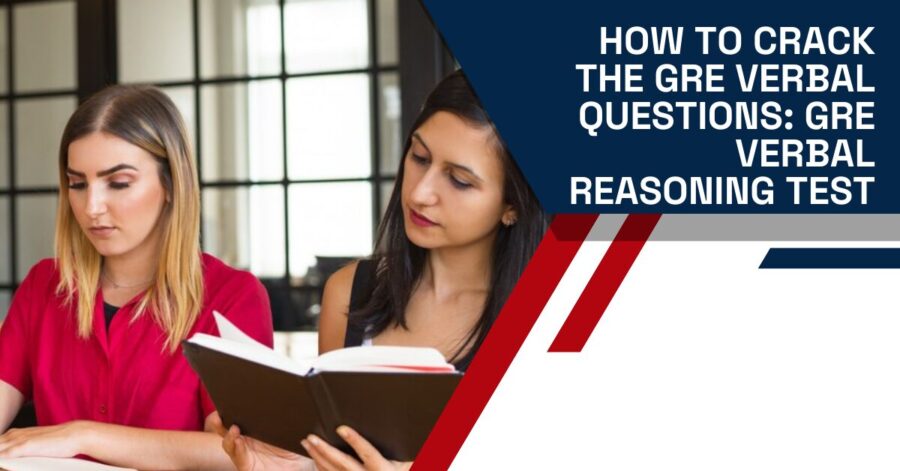7 October 2024
7 minutes read
How To Crack The GRE Verbal Questions: GRE Verbal Reasoning Test

Key Takeaways
- Sentence equivalence, text completion, and reading comprehension each test different skills in the GRE verbal questions.
- Success in the GRE Verbal section depends on your ability to analyze passages and select words that logically fit.
- Regularly practicing different question formats will sharpen your reasoning and improve your overall score on test day.
Did you know that only about 25% of test-takers score above 160 in the GRE Verbal Reasoning questions section? It’s a challenge that even the most prepared students often face, leaving many frustrated with their results. The GRE Verbal Reasoning section tests not only your vocabulary but also your ability to analyze complex texts and think critically under pressure. It’s not uncommon for students to feel overwhelmed by the sheer variety and difficulty of the questions.
But cracking GRE Verbal isn’t an impossible task. By focusing on targeted preparation strategies, such as practicing reading comprehension, expanding your vocabulary efficiently, and familiarizing yourself with common question types, you can drastically improve your performance. The key is to approach the test methodically, ensuring that you understand the structure and expectations, while also sharpening your problem-solving skills for every question type. GRE verbal for international students also remains the same.
What Is The GRE Verbal Reasoning Section?
The GRE Verbal Reasoning section is designed to assess your ability to understand and analyze written material. It challenges test-takers with a mixture of question types, including reading comprehension, sentence equivalence, and text completion. In this section, you will encounter passages followed by questions that test your understanding of the topic and logical reasoning. Have a clear idea of your GRE total marks as well.

Additionally, sentence equivalence and text completion questions require you to complete the sentence logically, selecting from multiple answer choices—sometimes involving a single blank or even several.
The GRE verbal section focuses heavily on vocabulary, making it essential to familiarize yourself with academic terms. Your task is to identify the correct answer by recognizing synonymous meanings or choosing the word that best fits the context of the paragraph or passage. You can go for good GRE and TOEFL books to help you here.
On test day, the challenge lies in quickly determining the most logically sound response. It’s not just about knowing definitions; you need to crack the section by understanding how words function in context. With solid GRE prep, you can improve your chances of accurately answering each question type and boost your score.
What Does GRE Sentence Equivalence Consist Of?
GRE Sentence Equivalence consists of questions that present a sentence with a single blank, followed by six answer choices. Your task is to select two options that complete the sentence in a way that provides the sentence with the same meaning. While it may seem like there’s only one answer, the trick is that two options are correct and should be synonymous or convey a similar meaning in the given context. Make sure to give emphasis to GRE time management as well.
These questions come with the challenge of finding the perfect pair, and partial correctness won’t earn you any credit—both choices must be right to score on this section of the exam. To succeed, you need to understand how the sentence flows and how each option changes its meaning. If you’re unsure about both options, it’s better to continue reviewing them until you’re confident in selecting the pair that fits.
How To Approach GRE Reading Comprehension and GRE Text Completion Questions?
To succeed in GRE Verbal Reasoning, it’s crucial to understand how to approach both GRE Reading Comprehension and GRE Text Completion Questions. These sections test different skills, but both require strong analytical thinking and careful attention to detail.
GRE Reading Comprehension questions come in various formats, ranging in length from one paragraph to longer passages. These questions test your ability to understand and analyze texts, often from subjects like the social sciences or humanities. They ask you to extract key ideas, make inferences, and evaluate the author’s purpose or tone. You can take a GRE diagnostic test to know where you stand.
Each passage typically has multiple questions, and while the format may appear straightforward, the difficulty increases as you dig deeper into the text. A helpful strategy is to identify the clue within the passage that supports the correct answer, while avoiding options that may seem right but don’t fully align with the passage. These questions are designed to give insight into your ability to understand one’s point of view and to critically evaluate information.
On the other hand, GRE Text Completion questions require you to fill in the blank within a sentence or passage by choosing words that logically complete the sentence. These questions may have one, two, or three blanks, and for each blank, you must select the single correct answer from a set of six answer choices. Unlike reading comprehension, where the passage is longer, text completion often deals with shorter sentences. You can also take GRE vocab quiz to help you here.
The difficulty lies in ensuring that the chosen words not only fit grammatically but also maintain the intended meaning of the entire passage. Be mindful of the structural distinction between different choices; often, certain phrases or words can hint at the correct choice. Importantly, for sentences with multiple blanks, selecting two answer choices for the first and second blank must create a meaningful and cohesive sentence. If you only get part of the answer right, it will result in partially correct answers, earning no points.
A similar challenge exists in GRE test Sentence Equivalence questions, which consist of a sentence with one blank and six answer choices. You are required to select two words that both logically and structurally fit the sentence, providing the same meaning. Be cautious, as two words may seem correct but fail to capture the sentence’s nuance. This type of question reinforces the importance of understanding the vocabulary word in context.
GRE Verbal Section Practice Questions
GRE Verbal Section Practice Questions are a great way to strengthen your skills and get familiar with the types of questions you’ll face in the exam. Sentence equivalence questions consist of sentences with one blank, where you need to select two words from a list of six choices. These words must both logically fit the sentence and provide similar meanings. The challenge here is to identify the right pair that creates the intended meaning, as no graduate can score points by selecting only one correct word. You can also take GRE synonyms test here.

These questions indicate two types of reasoning: contextual understanding and vocabulary. You must make a choice for each blank, ensuring that the sentence maintains coherence. On the other hand, part of the passage in RC (Reading Comprehension) may ask for inferences, details, or the author’s purpose. Text completion questions ask you to fill one or more blanks with a suitable word, and there are multiple blanks per blank, requiring a choice for each blank. Start with a GRE one month study plan.
A passage consisting of one or more sentences may require three answers or more, depending on the structure. A wealth of practice can help you understand how to approach these questions, which are designed to compose complex meanings using a combination of context and vocabulary. Each answer must logically fit and complete the sentence differently, reinforcing your ability to adapt to multiple formats in the GRE verbal section.
Conclusion
Mastering the GRE Verbal Reasoning section requires a strategic approach to handling sentence equivalence, text completion, and reading comprehension questions. By understanding the nuances of each question type and honing your vocabulary and analytical skills, you can improve your performance and approach the exam with confidence. Regular practice, coupled with a focus on context and logical reasoning, will allow you to tackle even the most challenging questions and achieve the best possible results on test day. A good GRE study plan can help you here.
Elevate your GRE performance with Ambitio’s tailored strategies. Our preparation platform gives you a competitive edge, offering advanced insights into the GRE’s structure and scoring, alongside targeted practice to enhance your skills and confidence.
FAQs
What is the best way to improve vocabulary for the GRE Verbal section?
The best approach to improving vocabulary is by reading a variety of academic and literary materials, such as articles, journals, and essays from disciplines like social sciences and humanities. It’s also helpful to create a word list of unfamiliar words you encounter and learn them in context rather than in isolation. Tools like flashcards, apps, and word games can also reinforce learning, but make sure you’re actively using these words in your practice, not just memorizing them.
How do I approach a GRE Sentence Equivalence question if I know one correct answer but can’t figure out the second one?
If you’re sure of one correct answer, focus on finding another word that is both a synonym and fits logically in the sentence. Avoid picking a word just because it seems to work individually—both choices must create the same meaning. Eliminate words that change the tone or direction of the sentence, and remember that GRE sentence equivalence questions are designed to test nuanced understanding of word meanings.
What should I do if I find the GRE Reading Comprehension passages too difficult or technical?
If you find a passage challenging, don’t get discouraged. First, skim the passage to get a general idea of the topic, then go back and read the relevant sections more thoroughly for specific questions. Focus on identifying key arguments and how the author structures their reasoning. Try to improve by reading articles from different fields, especially in subjects like economics, sociology, or psychology, which are common in GRE RC questions.
Can I approach text completion questions the same way as sentence equivalence questions?
While both question types require a focus on context and vocabulary, the approach is slightly different. In text completion, each blank should be filled independently, but together the selected words must create a cohesive meaning. Look for structural clues in the sentence that indicate tone or contrast, and choose words that fit both individually and as a whole. In sentence equivalence, you need two words that create the same meaning, which is more about finding synonyms.
How can I manage my time effectively during the GRE Verbal Reasoning section?
Time management is key to doing well in the GRE Verbal section. Start by answering the questions you find easiest, especially text completion and sentence equivalence, as they typically take less time than reading comprehension. For RC questions, avoid getting stuck on difficult passages. Instead, quickly identify the question type, skim the passage for relevant details, and move on if needed. Practicing with timed tests before the actual exam will help you get used to the pace.
How many reading comprehension passages should I expect in the GRE Verbal section?
On average, you will encounter 3-4 reading comprehension passages per section, varying in length and complexity. Some passages may be a single paragraph, while others are longer. These passages are accompanied by multiple questions, which will test a range of skills, including identifying main ideas, understanding the structure of an argument, and making inferences. The best way to prepare is by practicing with a variety of reading materials to familiarize yourself with different styles of writing.
Is there partial credit for questions with multiple blanks in text completion or sentence equivalence?
No, the GRE does not award partial credit for questions with multiple blanks. For both text completion and sentence equivalence, all correct answers must be selected for you to earn full credit. This makes it crucial to double-check your choices and ensure that each word fits both grammatically and logically into the sentence or passage.

You can study at top universities worldwide!
Get expert tips and tricks to get into top universities with a free expert session.
Book Your Free 30-Minute Session Now! Book a call now




























